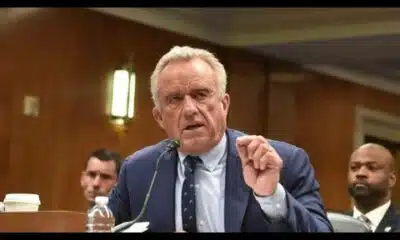News from the South - Georgia News Feed
Georgia’s “anti-doxxing” legislation upsets the balance between free speech and privacy
Georgia’s ‘anti-doxxing’ legislation upsets the balance between free speech and privacy
by Harsh Patel, Georgia Recorder
March 18, 2025
No one – whether they are a private figure or a public official – wants to be harassed online with their private information paraded about for others to use to target them or their family members.
For instance, Eliud Bonilla, an American citizen, was temporarily removed from the voter rolls in Virginia due to a clerical error. Even though his voter registration was restored, a watchdog group published his personal information online, suggesting that he was a “noncitizen voter” who had committed voter fraud, causing him to fear for his safety. This sort of thing shouldn’t happen.
Unfortunately, the legislative fix that the Georgia General Assembly is working on – Senate Bill 27 – isn’t threading the needle quite right. In its current form, it would prohibit large amounts of truthful speech while still not effectively safeguarding people’s personal information. Moreover, SB 27 would largely duplicate already existing laws that criminalize much of the conduct the bill seeks to prevent.
The legislation makes it a crime to electronically post or transmit another person’s identifying information, including their name or where they work, if that information is “reasonably likely” to be used by another party to cause the identified person “reasonable fear” of physical injury, significant economic injury, or mental anguish.
There are several concerns with this expansive definition of criminal liability. First, it outlaws sharing identifying information that is already public. These days, people publicly post information about themselves online all the time, whether it’s photos on Instagram or their employment history on LinkedIn. Yet, another person who shares this already-public information could still be criminally charged under SB 27 if a third party uses it to harass or intimidate the identified party.
This leads to a second problem with the bill: It requires a person sharing identifying information about another to predict what a third party is “reasonably likely” to do with it. For instance, someone who posts a critical comment in a Facebook group about a local official that includes the official’s name and where they work, may find themselves arrested under SB 27 if another person in the group (whom the poster is unaware of) then sends violent hate mail to the official. SB 27 also contains no requirement that the third party’s malicious use of the identifying information occur close to the time when the poster shared it. So, even if the hate mail was sent months after the post was made, the poster could still be charged. The uncertainty of trying to forecast the future actions of unknown third parties will leave would-be critics no choice but to stay silent if they want to avoid criminal liability under SB 27.
A third problem with the bill is that it does not require actual injury to result from the posting of identifying information. It only requires that the information be used in a manner that would cause the identified person to have “reasonable fear” of stalking or physical harm, or to experience significant economic harm or emotional distress. This adds yet another layer of unpredictability about what can lawfully be shared because of the subjective nature of what amounts to grounds for “reasonable fear.”
Taken together, SB 27’s defects make it nearly impossible for would-be speakers to distinguish what information about another person can be electronically transmitted versus what could land them in jail. This will chill far more speech than the drafters of the bill likely meant to deter. As the United States Supreme Court has long recognized, laws with uncertain meanings as to what speech is prohibited “inevitably lead citizens to steer far wider of the unlawful zone . . . than if the boundaries of the forbidden areas were clearly marked.”
To be sure, SB 27 requires that the person transmitting the personally identifying information do so with “reckless disregard” for how others might use the information, but that provides no safe harbor from criminal prosecution. “Reckless disregard” can easily be alleged, even if it cannot ultimately be proven. Similarly, the bill contains a “constitutional savings clause” that says it’s not a crime if you post the information in furtherance of constitutionally protected activity. But, this is only an affirmative defense the poster will still have to prove. People will choose not to exercise their First Amendment right to speak, rather than risk fighting a criminal prosecution.
Finally, SB 27 is largely duplicative of other Georgia laws that already prohibit the same conduct the bill seeks to deter. For instance, Georgia common law already recognizes the tort of publication of private facts. Georgia Code § 16-11-39.1 classifies harassing as any form of electronic communication being used to harm others. And Georgia Code § 16-11-37 punishes an individual who makes a threat of violent crime toward others. With such laws already on the books, SB 27 would be detrimental to First Amendment rights without actually providing significant additional protections to potential crime victims.
The best course of action would be for the Georgia Legislature to reject SB 27. Short of that, the bill should be narrowed to restrict only the posting of identifying information that is not otherwise publicly available (e.g., bank account, Social Security, or unpublished cellphone numbers); require that the poster intentionally share the information for the sole purpose of causing violence or harassment toward the individual identified; and require that the sharing of the information cause actual harm (either physical, emotional or financial) to the identified person. Georgia lawmakers should take a critical look at SB 27 and either set it aside or significantly narrow it.
GET THE MORNING HEADLINES.
Georgia Recorder is part of States Newsroom, a nonprofit news network supported by grants and a coalition of donors as a 501c(3) public charity. Georgia Recorder maintains editorial independence. Contact Editor John McCosh for questions: info@georgiarecorder.com.
The post Georgia’s “anti-doxxing” legislation upsets the balance between free speech and privacy appeared first on georgiarecorder.com
News from the South - Georgia News Feed
6-year-old wounded in crossfire between cars in Smyrna
SUMMARY: A 6-year-old child was hospitalized after being shot during a road rage-fueled shootout between two vehicles at a busy Smyrna, Georgia intersection on Sunday afternoon. The incident occurred near Spring Road and Campbell Road, close to a shopping center and gas station. Surveillance footage captured the gunfire. Police say the child, a passenger in one of the vehicles, was shot in the abdomen and rushed to the hospital. Two men, Craig Radcliff Calhoun and Eric Allen, face charges including aggravated assault, child cruelty, and firearms possession. Authorities emphasize the dangers of road rage and urge drivers to remain calm.
Two suspects, Craig Radford Calhoun and Eric Allen Rushi, have been arrested and face multiple charges.
Subscribe to FOX 5 Atlanta!: https://bit.ly/3vpFpcm
Watch FOX 5 Atlanta Live: https://www.fox5atlanta.com/live
FOX 5 Atlanta delivers breaking news, live events, investigations, politics, entertainment, business news and local stories from metro Atlanta, north Georgia and across the nation.
Watch more from FOX 5 Atlanta on YouTube:
FOX 5 News: https://www.youtube.com/playlist?list=PLUgtVJuOxfqkmrF1fONNmi8nKI0Z-FPE-
FOX 5 Atlanta I-Team: https://www.youtube.com/playlist?list=PLUgtVJuOxfqlb_I16wBwizoAoUsfKEeWB
Good Day Atlanta: https://www.youtube.com/playlist?list=PLUgtVJuOxfqlKT5xsbsPFgr5EBzdsWTvG
FOX 5 Extras: https://www.youtube.com/playlist?list=PLUgtVJuOxfqli-5MS_2X-i6bNGWvV0RYP
You Decide: https://www.youtube.com/playlist?list=PLUgtVJuOxfqnCKb7UkRde2NXuaoPEAXut
Download the FOX 5 Atlanta app: https://www.fox5atlanta.com/app
Download the FOX 5 Storm Team app: https://www.fox5atlanta.com/storm
Follow FOX 5 Atlanta on Facebook: https://facebook.com/fox5atlanta
Follow FOX 5 Atlanta on Twitter: https://twitter.com/FOX5Atlanta
Follow FOX 5 Atlanta on Instagram: https://www.instagram.com/fox5atlanta/
Subscribe to the Morning Brief and other newsletters from FOX 5 Atlanta: https://www.fox5atlanta.com/email
News from the South - Georgia News Feed
Minnesota suspect hit with federal murder, stalking charges
SUMMARY: Federal prosecutors charged Vance Boelter, 57, with murder and stalking after he allegedly shot and killed former Minnesota House Speaker Melissa Hortman and her husband, and wounded state Sen. John Hoffman and his wife. Authorities say Boelter visited other officials’ homes and left behind notebooks listing over 45 targets. Found in his abandoned SUV were five guns and ammo; a Beretta handgun and facemask were recovered nearby. He texted his family about going “to war” before being arrested Sunday. Prosecutors may pursue the death penalty. Officials described the attack as a calculated assault on public servants and a “nightmare.”
The post Minnesota suspect hit with federal murder, stalking charges appeared first on www.wsav.com
News from the South - Georgia News Feed
Morning Forecast for Monday, June 16th
SUMMARY: Monday, June 16th, will be hot and muggy with temperatures mostly in the 70s to low 90s. Expect a mix of sun and clouds in the morning with isolated afternoon thunderstorms developing after 1 PM. Some areas will experience showers, but many will remain dry. Outdoor activities may be impacted by saturated grounds and rain. The humid weather continues all week due to persistent Gulf moisture, with scattered storms likely daily. Rain chances range from 30-40% early in the week, dropping to about 20% by Friday. Cooler, drier air is expected late in the week but moisture returns over the weekend.
Isolated showers and thunderstorms
Subscribe to 11Alive on YouTube: https://www.youtube.com/11Alive
11Alive+ Watch Your News Now: https://www.11alive.com/watch
Website: https://11alive.com
Facebook: https://www.facebook.com/11Alive/
Get the 11Alive app: https://interactive.11alive.com/appredirect/
-
Mississippi Today5 days ago
Retired military officer: In America, the military is not used against its own citizens for law enforcement
-
News from the South - Missouri News Feed6 days ago
Repeated problems at Raytown park frustrate neighbors
-
News from the South - Alabama News Feed7 days ago
Deadly Sunday in Mobile County leaves 5 people dead
-
News from the South - South Carolina News Feed7 days ago
SLED investigates Florence traffic stop amid racial profiling allegations
-
News from the South - Florida News Feed4 days ago
Former Jacksonville radio host Mark Kaye announces he’s running for Congress, bashes current Rep. John Rutherford
-
News from the South - Georgia News Feed7 days ago
Georgia GOP's attempt to block Brad Raffensperger from running as a Republican may go nowhere
-
News from the South - Alabama News Feed7 days ago
News 5 NOW at 8:00am |Tuesday, June 10, 2025
-
News from the South - Florida News Feed7 days ago
HHS Secretary Robert F. Kennedy Jr. firing every member of panel that makes vaccine recommendations









































